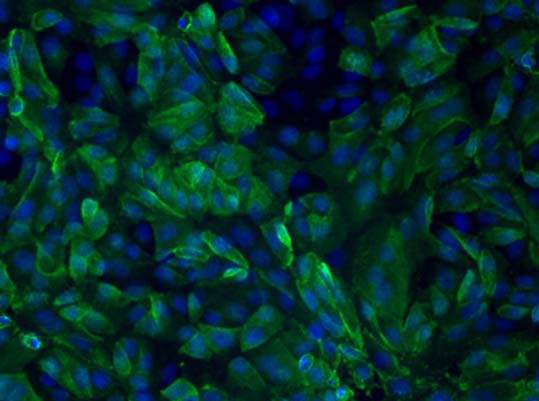
| July 2015 | |||||||||||
| Top stories | |||||||||||
| In the news | |||||||||||
| Photos | |||||||||||
| Contact us | |||||||||||
| Archive | |||||||||||
|
CDC grant funds laboratories’ preparedness for Ebola and other ‘high consequence’ pathogens |
A grant from CDC will fund a State Hygienic Lab program to enhance Iowa’s clinical laboratory preparedness programs for processing high consequence pathogens, including Ebola. The three-year, $440,000 grant is part of a $970,000 Iowa Department of Public Health grant that will be used to strengthen biosafety and public health programs throughout the state.

Human serum antibodies react with MERS-CoV-infected Vero cells, indicating the patient has been infected with MERS-CoV. (MERS image courtesy of Jennifer L. Harcourt through CDC)
Pathogens that are considered to have high consequences, according to the CDC, “may occur infrequently but are associated with high rates of morbidity and mortality,” such as anthrax, MERS-CoV and Ebola.
The Hygienic Lab is certified by CDC to test for select agents such as anthrax, and emerging threats such as MERS-CoV. In December 2014 the laboratory also was certified to test for Ebola. Although no cases of Ebola were suspected or confirmed in the state during the recent international outbreak, it spurred the need for laboratories to evaluate their biosafety and preparedness programs.
The grant will fund a biosafety specialist who will meet with clinical laboratories in the state to determine areas of need related to the testing process for such pathogens. This includes working with the CDC on processes for handling of specimens, precautionary measures and guidance documents.
The project is expected to augment the Hygienic Laboratory’s current safety programs, such as Wet Workshops for handling highly infectious agents that may be used in acts of terrorism.